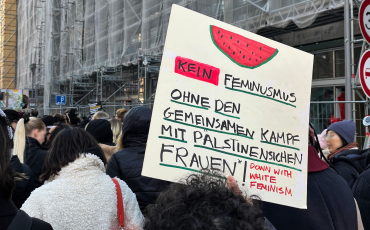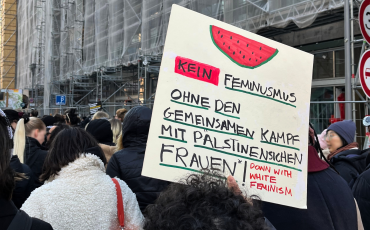Israelis are increasingly divided over the urgency of peace. Polling indicates that various forms of sanctions intended to pressure Israel can signal urgency, but mostly among those who already support a two-state agreement. It is worth considering other policy measures in the toolbox for advancing peace.
Given the intransigence or ineffectiveness of Israeli and Palestinian leaders at advancing peace, it is logical for the EU policy community to consider measures designed to pressure the sides towards peace. Diplomatic pressure has sometimes borne fruit, including ceasefires and progress on the peace process in the 1990s. In Israel, the key question is whether the response will be compliance or defiance. Will sanctions measures pressure Israel to take serious steps towards ending occupation, or will Israeli society double down on its current policy in response, in order to spite any attempts to force its hand?
To answer this, I have conducted polling of the general public specifically on the question of sanction measures, including two studies in November 2016 and July 2017. To understand the context for responses to the sanction options, it is important to understand general Israeli public attitudes on the conflict at present.
The conflict is no priority
The Israeli-Palestinian conflict is not seen as a matter of high urgency in Israeli priorities. In the 2017 poll, which is unpublished, just over half (52 per cent) of the public say it is highly urgent to resolve the conflict. Among the Jewish population, which is reflected by Israel’s all-Jewish governing coalition, just 44 per cent view it as highly urgent. In the June 2017 Israeli-Palestinian survey I have conducted with Tel Aviv University and the Palestinian Center for Policy and Survey Research, almost the same portion of Israelis, 53 per cent, still support a two state solution, but only 47 per cent of Jews. Fifty-five percent prefer the status quo to a two state solution at present, and 62 per cent of Jews. The Israeli-Palestinian surveys also found that one of the driving forces behind this skepticism is the perception that a two-state solution is increasingly impossible. These findings indicate that nearly half of Israelis do not intuitively see the need to end the conflict. This makes them unlikely to accept the logic behind external pressure on their country to reach a solution they believe is hardly feasible, and not necessarily needed, at present.
However, much of the opposition to a two-state solution in Israel is pragmatic rather than ideological. To be sure, a portion of the right-wing is ideologically opposed. But large numbers of Israelis would change their minds and support an agreement if specific incentives were added to a future agreement. Incentives can be symbolic, such as Palestinians recognizing the historic and religious heritage of Jews in the land, or changing textbooks that incite against Jews; or material items – such as full normalization with Arab states.
Measures probably don’t convince new groups
However, until such a time, how would Israelis react to external pressure? I tested a range of items in two surveys, from the US cutting military aid, to the UN and US placing travel restrictions on settlers, an EU ban on settlement products or the UN freezing assets of Israeli companies that work partially or entirely in the settlements. The surveys found that between 44 per cent to over half of Israelis said these measures would cause them to support either a settlement freeze, or the basic framework for a two-state solution. In 2017, the range was just slightly lower for the goal of freezing settlements (49 per cent – 54 per cent), and slightly higher for supporting a two-state framework in the face of pressure tactics (52 per cent – 58 per cent); overall this range shows that there was not a significant variation between the effectiveness of different measures.
Those findings largely mirror the range of existing support for a two-state solution in Israel cited earlier, indicating that the measures do not necessarily convince new groups who are currently opposed – but nor does it indicate that they would create a backlash of defiance. A deeper analysis also shows that they have potential to generate greater urgency, including among key sub-groups such as centrists, and even a small portion of the right-wing.
However, the public is not an independent actor – the Israeli government’s response to pressure measures, together with media commentary will all influence the broad social discourse. From the Israeli government’s reactions to the minor measures that have been implemented to date, such as EU funding guidelines that prohibit EU institutions from funding projects in settlements, to product origin labelling, it is clear that each development will be met with rampant accusations of anti-Israel or even anti-Semitic intentions. In the US, the Israeli government has even taken legal action against potential boycotts; these tactics have been tried in the EU as well. Given this aggressive response, it is likely that sanctions that create minor inconvenience or send a symbolic message will be easily branded in Israel as ‘delegitimization’, and subsequently dismissed.
The two measures cited above have had no tangible impact on government policy with relation to the occupation, settlements, or the long-dormant peace process; and for the moment public debate has died down. But large-scale sanctions that would actually do deeper harm to Israeli society or economy are almost impossible due to the combination of historic sensitivities and the interests of EU member states, since Israel is a major trade partner.
There are more options
Instead, there are other policy options that have not yet been exhausted. Quiet withdrawal of European companies from Israel’s private sector creates difficulties on the ground, even without flashy headlines – such as Veolia ending its Israel holdings, and the termination of France Telecom’s brand-use contract with an Israeli mobile phone provider. Neither company can be accused of boycott, since neither company admitted that this was the reason; but the results were felt, and the aura of political pressure hung over Israel’s private sector. Creating the conditions for more such cases could have an impact.
A second approach is to continue pushing for incentives to be added to a final status agreement, even absent negotiations. This would entail continued emphasis on the detailed two-state package in interactions with Israel (rather than just a focus on the general idea of a two-state solution), while advancing the type of incentives mentioned earlier or a range of others that have been tested: guaranteed access to all Jewish holy sites, joint economic ventures, access to Palestinian air space, as examples. Holding consultations and forums to debate these ideas or generate others can perhaps re-ignite interest in the final status solution and lay the groundwork for future success. As noted, polling clearly shows that a significant portion of the actual opposition to a two-state agreement can be convinced to support it with the right incentives.
Third, the EU can cultivate better conditions for restarting negotiations, to remove excuses and obstacles. One major such obstacle is the weak, divided Palestinian leadership, which is suffering from a severe legitimacy crisis at home – this constrains its willingness to take risks on the peace process. A more assertive role in promoting good governance and democratic politics in Palestine can both improve Palestinian life, and erode one of Israel’s key excuses for avoiding peace. The EU clearly has a role to play, and should keep trying the available policy options until one or a combination of them works.
Dr. Dahlia Scheindlin is a public opinion expert and a political consultant who conducts extensive research on the Israeli Palestinian conflict and has advised five Israeli national election campaigns. She is also a Policy Fellow at Mitvim: The Israeli Institute for Regional Foreign Policies, where she leads a project on comparative conflict policy research.



















